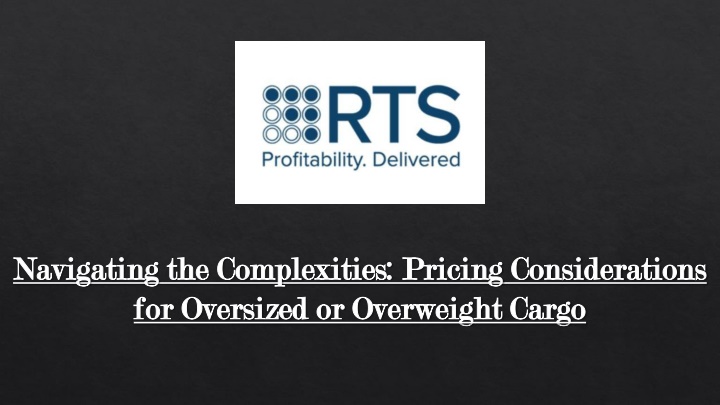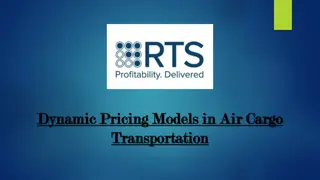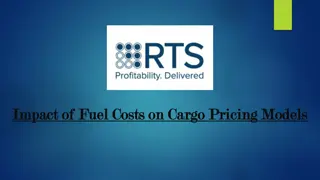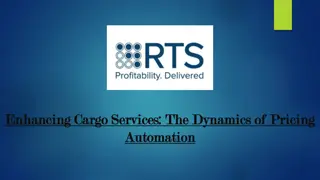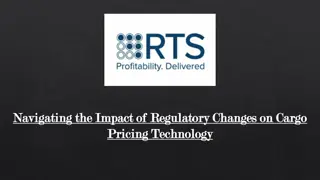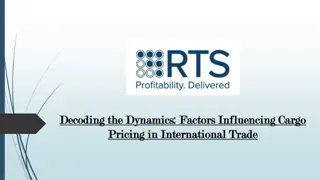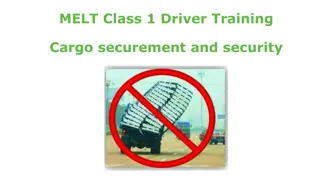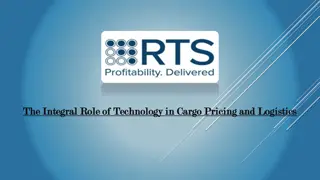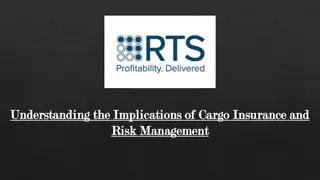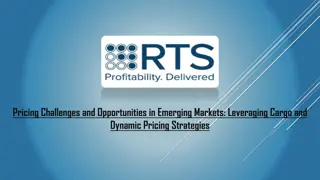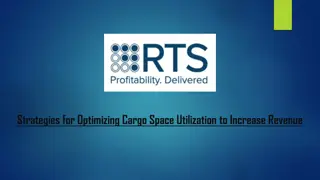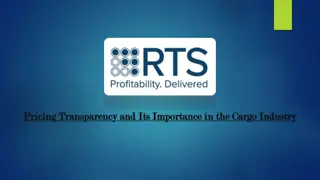Pricing Considerations for Oversized or Overweight Cargo
In the intricate world of logistics and transportation, pricing considerations for oversized or overweight cargo stand as a unique challenge for revenue technology services. As goods continue to diversify in shape, size, and weight, companies must adapt their pricing strategies to accommodate these specialized shipments effectively. In this blog post, we delve into the key factors that revenue technology services must consider when pricing oversized or overweight cargo, focusing on the pivotal role of cargo pricing.
Download Presentation

Please find below an Image/Link to download the presentation.
The content on the website is provided AS IS for your information and personal use only. It may not be sold, licensed, or shared on other websites without obtaining consent from the author.If you encounter any issues during the download, it is possible that the publisher has removed the file from their server.
You are allowed to download the files provided on this website for personal or commercial use, subject to the condition that they are used lawfully. All files are the property of their respective owners.
The content on the website is provided AS IS for your information and personal use only. It may not be sold, licensed, or shared on other websites without obtaining consent from the author.
E N D
Presentation Transcript
Navigating the Complexities: Pricing Considerations Navigating the Complexities: Pricing Considerations for Oversized or Overweight Cargo for Oversized or Overweight Cargo
In the intricate world of logistics and transportation, pricing considerations for oversized or overweight cargo stand as a unique challenge for revenue technology services. As goods continue to diversify in shape, size, and weight, companies must adapt their pricing strategies to accommodate these specialized shipments effectively. In this blog post, we delve into the key factors that revenue technology services must consider when pricing oversized or overweight cargo, focusing on the pivotal role of cargo pricing.
1. 1.Dimensional Weight Calculation: Dimensional Weight Calculation: Unlike standard shipments, oversized or overweight cargo often requires dimensional weight calculation. Revenue technology services must accurately assess both the weight and dimensions of the cargo to determine the appropriate pricing. This calculation method ensures fairness in pricing, considering the space occupied by the shipment in addition to its weight. 2. 2.Specialized Handling Requirements: Specialized Handling Requirements: Oversized or overweight cargo frequently demands specialized handling procedures, such as reinforced packaging, specialized equipment, or even customized transportation arrangements. These unique handling requirements add complexity to the pricing process, as revenue technology services must factor in the additional costs associated with specialized handling to arrive at a competitive yet profitable pricing structure. 3. 3.Transportation Mode Selection: Transportation Mode Selection: The choice of transportation mode significantly influences the pricing of oversized or overweight cargo. Whether shipped via truck, rail, air, or sea, each mode entails distinct cost structures and logistical considerations. Revenue technology services must weigh the pros and cons of each mode, considering factors such as transit time, capacity availability, and infrastructure constraints, to optimize pricing and ensure efficient delivery.
1. 1.Regulatory Compliance and Permits: Regulatory Compliance and Permits: Oversized or overweight cargo often necessitates compliance with regulatory requirements and obtaining permits for transportation. From oversize load permits to overweight permits, navigating the regulatory landscape is essential for ensuring legal compliance and avoiding potential delays or penalties. Revenue technology services must incorporate the costs associated with regulatory compliance and permit acquisition into their pricing models to provide transparent and competitive pricing to customers. 2. 2.Market Demand and Competitive Landscape: Market Demand and Competitive Landscape: Understanding market demand and the competitive landscape is crucial for pricing oversized or overweight cargo effectively. Revenue technology services must conduct thorough market research to assess demand trends, competitor pricing strategies, and customer preferences. By aligning pricing with market dynamics and offering differentiated value propositions, companies can capture market share while maintaining profitability in the oversized cargo segment. 3. 3.Risk Management and Insurance: Risk Management and Insurance: Oversized or overweight cargo inherently carries higher risks during transportation, including damage, theft, or accidents. Revenue technology services must factor in the costs of insurance coverage and risk management strategies when pricing such shipments. By adequately mitigating risks and providing comprehensive insurance options, companies can instill confidence in customers and safeguard their cargo throughout the transportation process.
In conclusion, pricing considerations for oversized or overweight cargo pose multifaceted challenges for revenue technology services. By integrating dimensional weight calculation, accounting for specialized handling requirements, optimizing transportation mode selection, ensuring regulatory compliance, analyzing market demand, and managing risks effectively, companies can develop competitive pricing strategies tailored to the unique needs of oversized cargo customers. Embracing innovation and leveraging advanced technology solutions will further empower revenue technology services to navigate the complexities of cargo pricing in an ever- evolving logistics landscape.
THANK YOU THANK YOU
